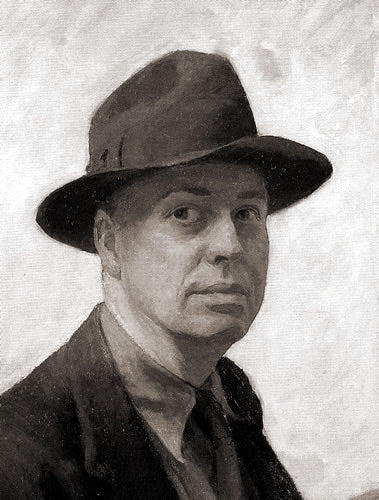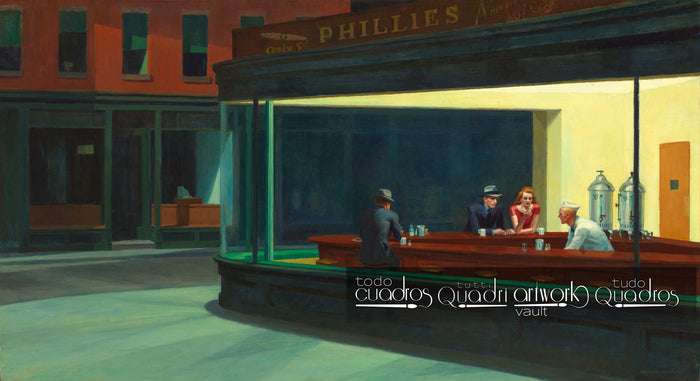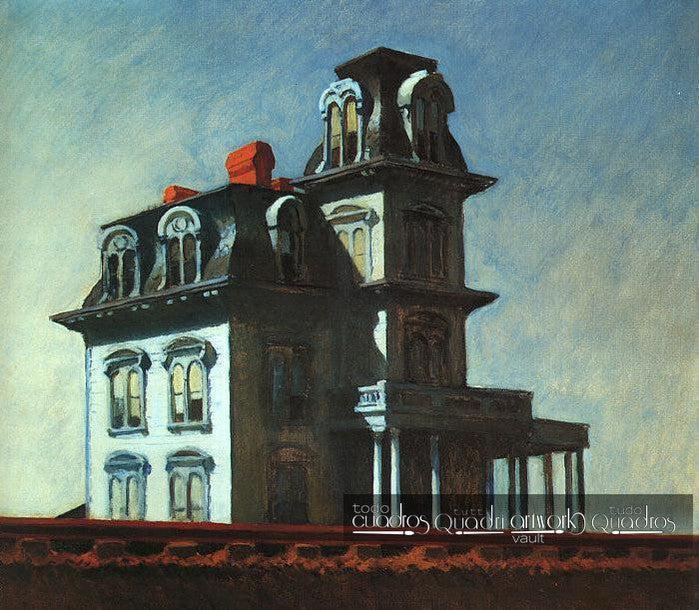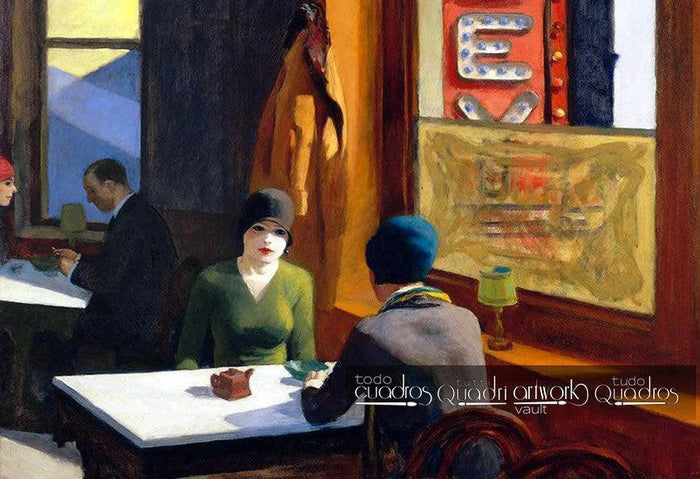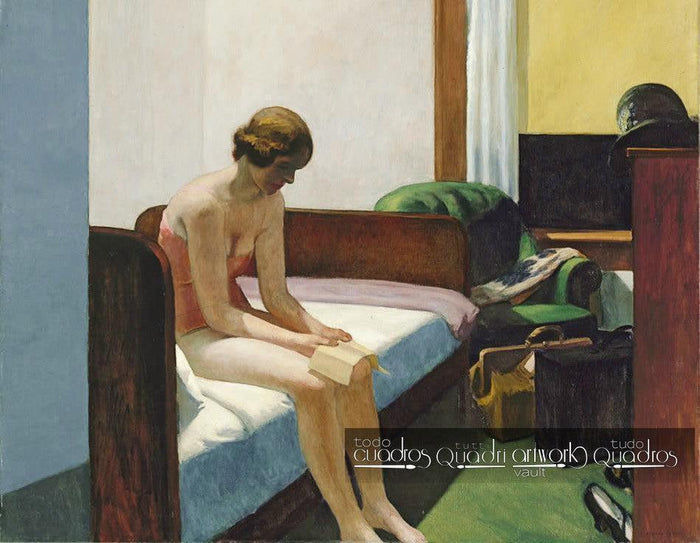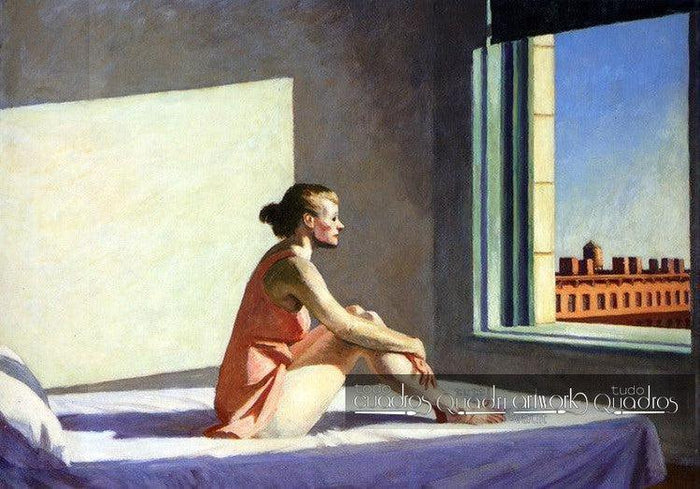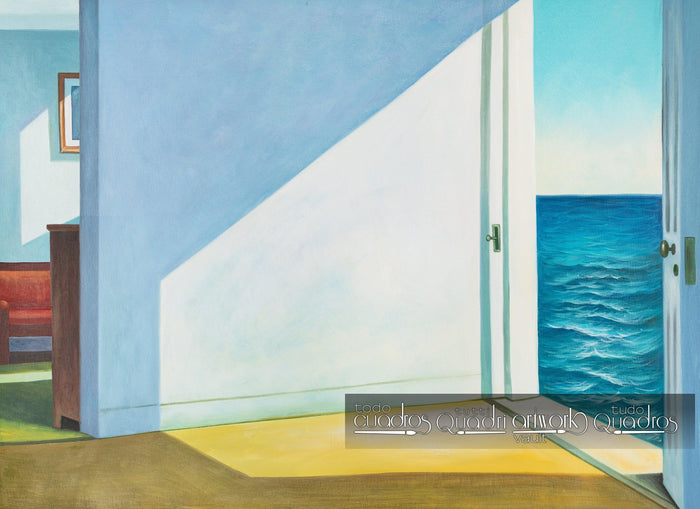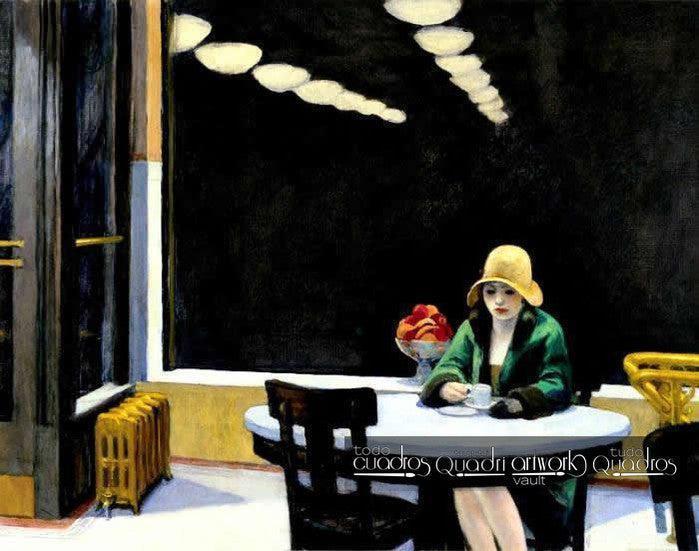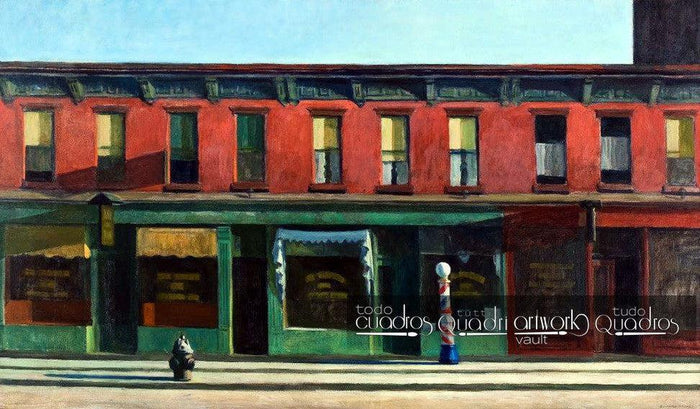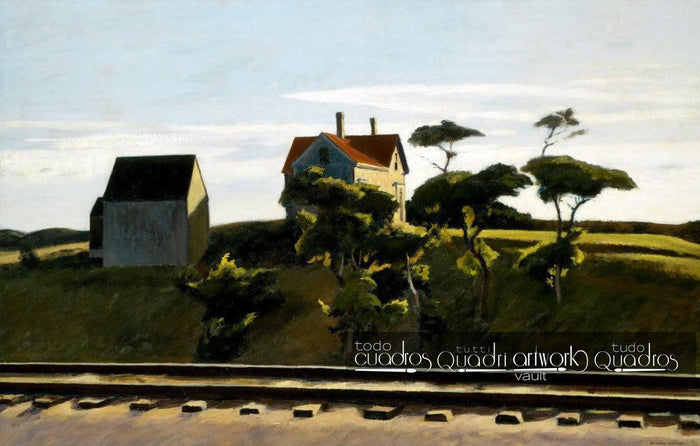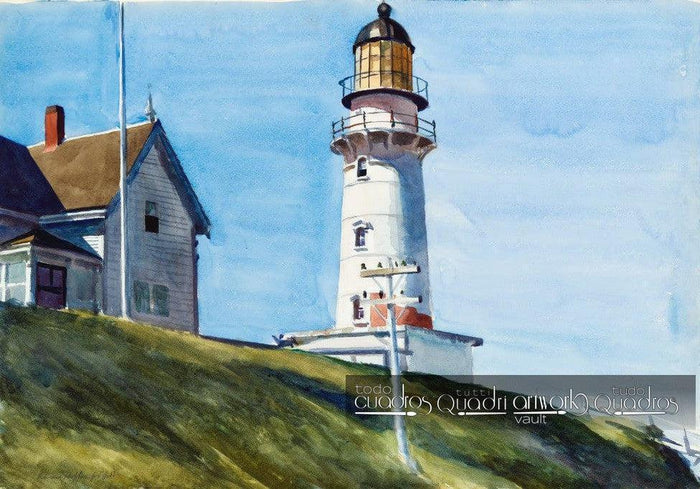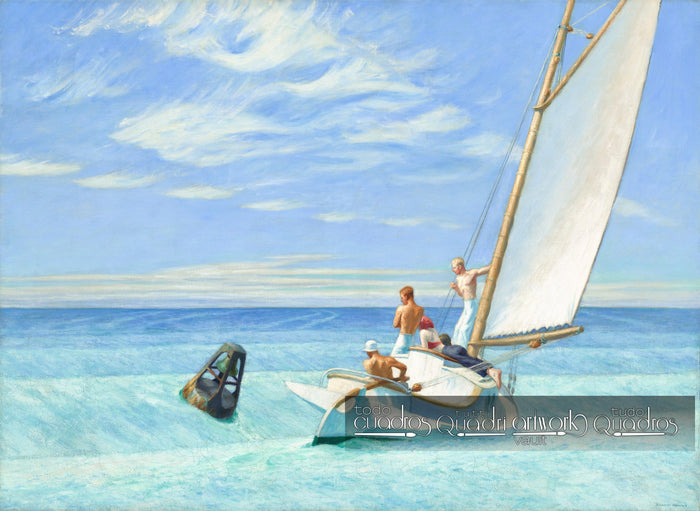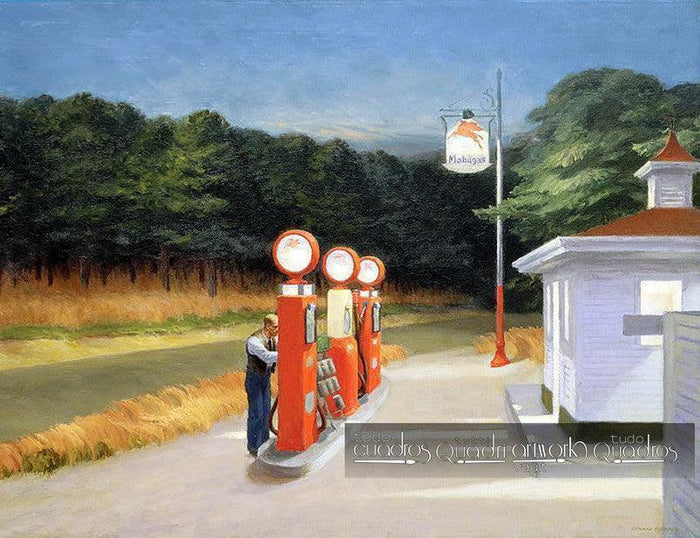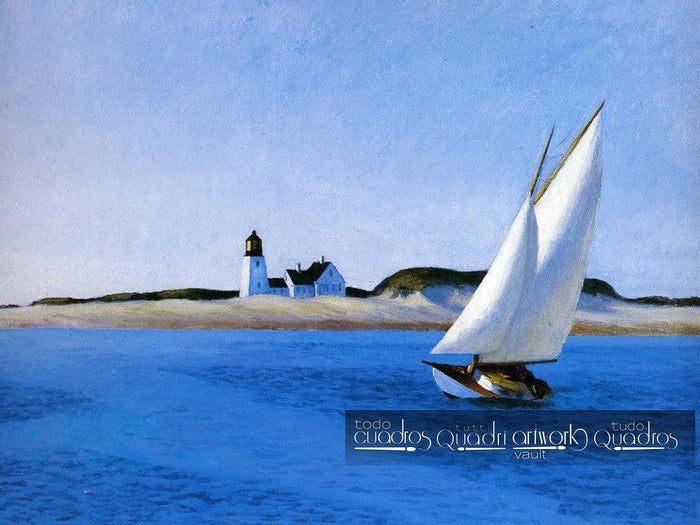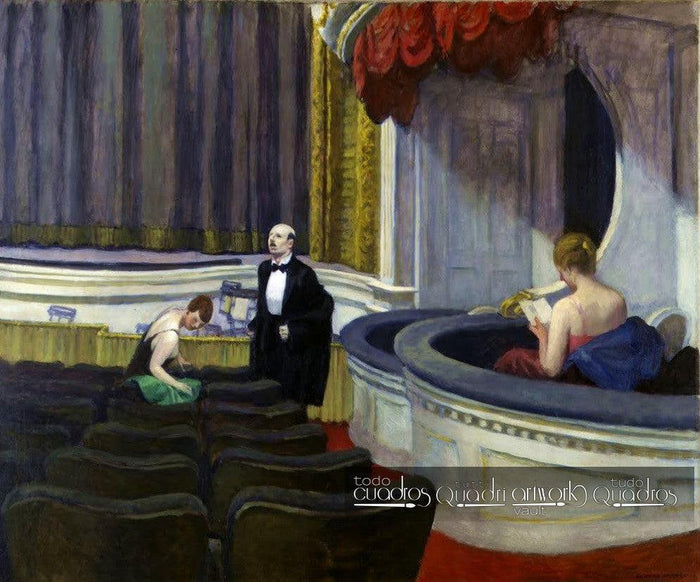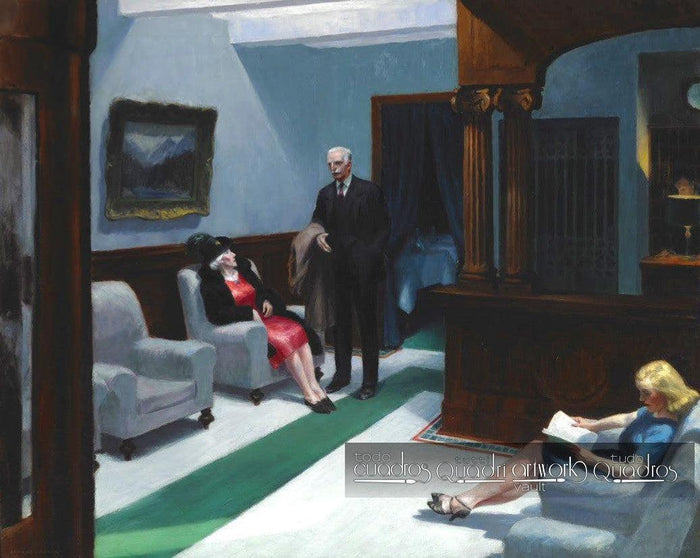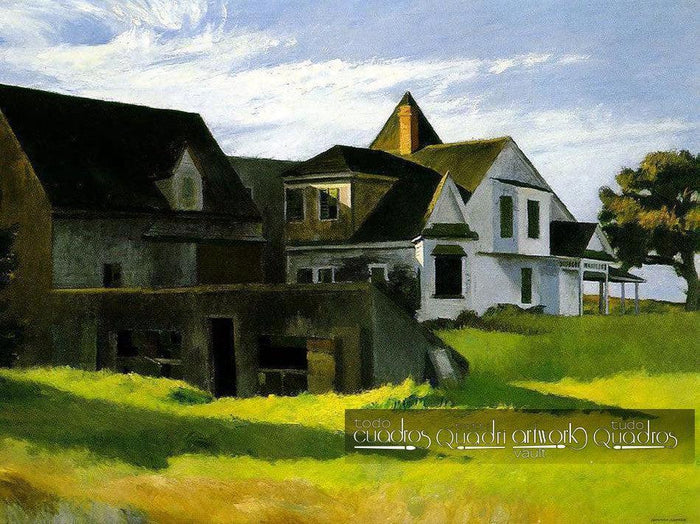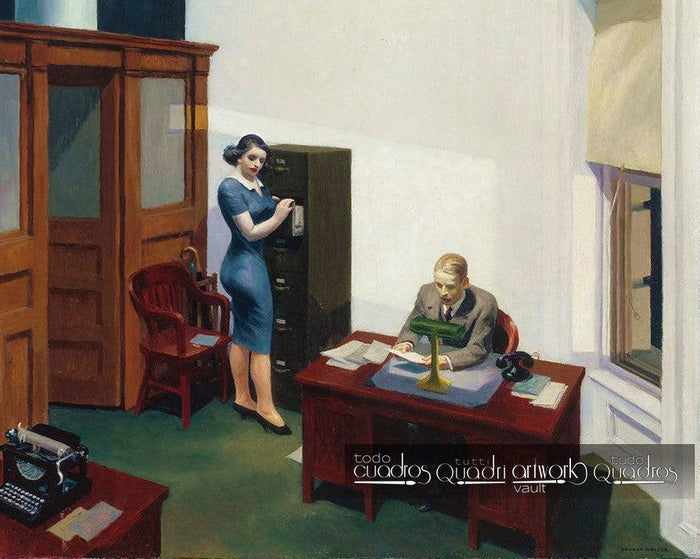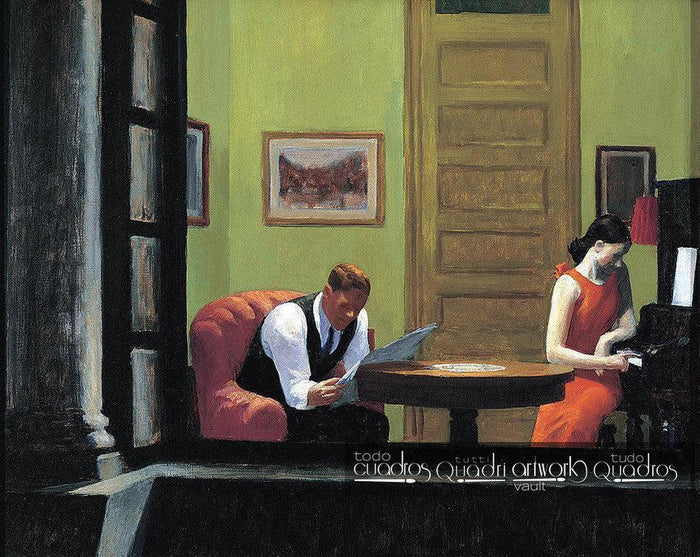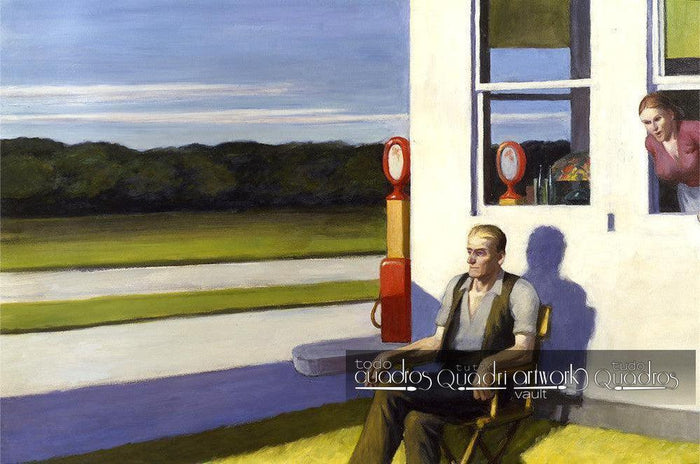Hopper Paintings
Hopper’s works are descriptive and meticulously crafted in every detail: lighting, characters, psychology, and setting. Reluctant to answer questions about himself and his art, when asked once he said: “The answer to everything is on the canvas…”
1. Nighthawks
| Author: | Edward Hopper |
|---|---|
| Original Title: | Nighthawks |
| Type: | Painting |
| Medium | Oil |
| Support: | Canvas |
| Year: | 1942 |
| Subject: | City life |
| Located: | Instituto de Arte de Chicago |
Depicts the night in a New York bar and its last customers. The work was an American icon for the young people of the time. The image clearly shows the loneliness of the big city and of modern existence.
2. House by the Railroad
| Author: | Edward Hopper |
|---|---|
| Type: | Painting |
| Medium | Oil |
| Support: | Canvas |
| Year: | 1925 |
| Located: | MoMA museum, New York. |
In the artist's compositions, it is very common to find a horizontal dividing element, which sharply separates the observer from the world present within the painting. In this case, he uses a train track for the purpose.
With this, according to experts, he makes the work impenetrable, establishing a dividing line that further enhances solitude and melancholy.
Read more
3. Chop Suey
| Author: | Edward Hopper |
|---|---|
| Original Title: | Chop Suey |
| Type: | Painting |
| Medium | Oil |
| Support: | Canvas |
| Year: | 1929 |
| Subject: | City life |
Work inspired by the urban environment of the United States in the 1920s. Two friends are seen having tea and chatting, dressed in the typical attire of the time.
"Chop Suey" is a dish from Chinese-American cuisine that became popular in the United States at the end of the 19th century and the beginning of the 20th century and was commonly found in Chinese restaurants and diners throughout the United States during the '20s and beyond.
4. Hotel Room
| Author: | Edward Hopper |
|---|---|
| Original Title: | Hotel Room |
| Type: | Painting |
| Medium | Oil |
| Support: | Canvas |
| Year: | 1931 |
| Subject: | City life |
| Located: | Thyssen Museum, Madrid. |
The work shows a woman sitting on the bed in her hotel room, evoking the loneliness and coldness of the morning, a very frequent inspiration in the artist.
5. Morning Sun
| Author: | Edward Hopper |
|---|---|
| Original Title: | Morning Sun |
| Type: | Painting |
| Medium | Oil |
| Support: | Canvas |
| Year: | 1952 |
| Subject: | City life |
| Located: | Museo de Arte de Columbus, USA |
The work conveys the loneliness of a woman on her bed, receiving the morning sun rays and looking melancholically through the window.
6. Rooms by the Sea
| Author: | Edward Hopper |
|---|---|
| Original Title: | Rooms by the Sea |
| Type: | Painting |
| Medium | Oil |
| Support: | Canvas |
| Year: | 1951 |
| Subject: | Seascapes |
The work is based on the view from his own summer studio in the city of Massachusetts, where he honed his technique for painting light effects. His interest in painting these types of contrasts accompanied him from the beginning of his artistic career.
7. Automat
| Author: | Edward Hopper |
|---|---|
| Original Title: | Automat |
| Type: | Painting |
| Medium | Oil |
| Support: | Canvas |
| Year: | 1927 |
| Subject: | City life |
| Located: | Des Moines Art Center, Iowa, USA |
It shows a woman in a café in front of a large window, through which the city's night lighting can be seen.
8. Early Sunday Morning
| Author: | Edward Hopper |
|---|---|
| Original Title: | Early Sunday Morning |
| Type: | Painting |
| Medium | Oil |
| Support: | Canvas |
| Year: | 1930 |
| Located: | Museo Whitney de Arte Estadounidense, New York |
9. New York, New Haven and Hartford
| Author: | Edward Hopper |
|---|---|
| Original Title: | New York, New Haven and Hartford |
| Type: | Painting |
| Medium | Oil |
| Support: | Canvas |
| Year: | 1931 |
| Subject: | Rural |
| Located: | The Indianapolis Museum of Art (IMA), USA |
The artist surprises once again with the characteristic warmth of his compositions: two rural cabins at the foot of the track, bushes, and small trees enveloped by the first rays of the morning, which reveal only their silhouette.
10. Light at Two Lights
| Author: | Edward Hopper |
|---|---|
| Original Title: | Light at Two Lights |
| Type: | Painting |
| Medium | Watercolor and Pencil |
| Support: | Paper |
| Year: | 1927 |
| Genre: | Seascapes |
| Located: | Museo Whitney de Arte Estadounidense, New York |
Belongs to the artist's earliest artistic stage, this particular one is an exercise in perspective and geometric composition. The techniques of lighting, coloring, and arrangement of elements were powerfully developed throughout his career, examples of this are the works: Cape Cod Afternoon (similar perspective) and Ground Swell (similar treatment of light).
11. Ground Swell
| Author: | Edward Hopper |
|---|---|
| Original Title: | Ground Swell |
| Type: | Painting |
| Medium | Oil |
| Support: | Canvas |
| Year: | 1939 |
| Genre: | Seascapes |
| Located: | Galería de Arte Corcoran, Washington |
Sports marina, shows a group of young people sailing a yacht in the swell. A very recognizable feature of his style is the clarity he attributes to sunny days in his canvases; as usual, there is no sun or rays, only the enveloping effect of both.
Read more12. Gas
| Author: | Edward Hopper |
|---|---|
| Original Title: | Gas |
| Type: | Painting |
| Medium | Oil |
| Support: | Canvas |
| Year: | 1940 |
| Subject: | Life in the suburbs |
| Located: | MoMA museum, New York. |
13. The Long Leg
| Author: | Edward Hopper |
|---|---|
| Original Title: | The Long Leg |
| Type: | Painting |
| Medium | Oil |
| Support: | Canvas |
| Year: | 1930 |
| Genre: | Seascapes |
| Located: | Galería de la Biblioteca Huntington, California |
Marine scene where a sailing boat and the sea can be seen against a backdrop of a small beach town. The work is considered an aesthetic model of art that blends sports imagery and landscape.
14. Two on the Aisle
| Author: | Edward Hopper |
|---|---|
| Original Title: | Two on the Aisle |
| Type: | Painting |
| Medium | Oil |
| Support: | Canvas |
| Year: | 1927 |
| Subject: | City life |
| Located: | The Toledo Museum of Art, USA |
Hopper is the modern specialist in conferring intensity and psychological complexity to the most ordinary moments. The viewer immerses themselves in the carefully composed scenes, identifying with or thinking about the characters, who usually appear isolated.
Read more15. Hotel Lobby
| Author: | Edward Hopper |
|---|---|
| Original Title: | Hotel Lobby |
| Type: | Painting |
| Medium | Oil |
| Support: | Canvas |
| Year: | 1943 |
| Subject: | City life |
| Located: | The Indianapolis Museum of Art (IMA), USA |
The work presents three guests waiting, each in their own way, in the grid-like hotel reception; the charmless lobby is struck by the intricate vitality of the characters.
Read more16. Cape Cod Afternoon
| Author: | Edward Hopper |
|---|---|
| Original Title: | Cape Cod Afternoon |
| Type: | Painting |
| Medium | Oil |
| Support: | Canvas |
| Year: | 1936 |
| Subject: | Rural |
| Located: | CMOA, Carnegie Museum of Art, USA |
It displays the sunset in Cape Cod, Massachusetts, USA. The artist captures the warm green and yellow tones that the sun reflects on the landscape of houses and vegetation.
17. Office at Night
| Author: | Edward Hopper |
|---|---|
| Original Title: | Office at Night |
| Type: | Painting |
| Medium | Oil |
| Support: | Canvas |
| Year: | 1940 |
| Subject: | City life |
| Located: | Walker Art Center, Minnesota |
The canvas displays a North American office scene from the 1930s, in which people are still working. The artist aims to highlight the frivolity of the New York urban customs of the time.
18. Room in New York
| Author: | Edward Hopper |
|---|---|
| Original Title: | Room in New York |
| Type: | Painting |
| Medium | Oil |
| Support: | Canvas |
| Year: | 1932 |
| Subject: | City life |
| Located: | Sheldon Museum of Art, Lincoln (Nebraska) |
Portrays, in his particular bohemian style, a social scene characteristic of the 1920s in the United States.
19. Four Lane Road
| Author: | Edward Hopper |
|---|---|
| Original Title: | Four Lane Road |
| Type: | Painting |
| Medium | Oil |
| Support: | Canvas |
| Year: | 1956 |
| Subject: | Life in the suburbs |
See it in the store under Hopper oil paintings
Related famous painters in the store:
↑Back to top
